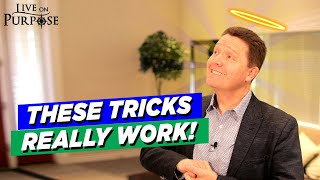One of our viewers asked, “Doctor Paul, how do you do the right thing when it's hard?” There's some psychological tricks to this. And I'm going to fill you in on each one of them. First of all, newsflash! The right thing often is hard.
Do you remember in Harry Potter where Dumbledore is talking to Harry and he says, “There will come a time when you have to decide between doing what is right and doing what is easy.” That implies that the right thing is hard.
My friend Art Coombs is just finishing his new book entitled, Hard Easy, Easy Hard, and it's about this concept where if you choose to do the easy thing right now, you probably are going to create a harder life for yourself. And then the converse of that. If you choose to do the hard thing now, you're more likely to set up an easier life for yourself. Hard easy, Easy hard.
Quick example of that: My son used to run cross-country in high school. And for these cross-country meets, they would get together and run 5 kilometers in a race. Could you do that today? I'm not sure I could. But this is what they would do at every meet. What did they do to prepare for those meets? Well, they would get together and they would work out. They would exercise, they would run. They would basically get themselves in condition to go run the race on the weekend. Is it easy to go work out? No. It would be much easier to just go watch a television program or something. And I remember my son once commenting, “Oh, it's so hard to go to these workouts.”
Well, going to do the workout made it a whole lot easier when race day came. What happens to those who skip the workout? It's going to be a whole lot harder.
I experienced this myself when I moved here to the town where we live currently. I had just come out of graduate school and I just finished my dissertation. I was a little out of shape physically, I've never been terribly out of shape, but I wasn't up to par. And I went and ran a 5k race. It was so hard, I was sucking air. I was burning up. I could barely even cross the finish line. And I had stopped several times during the race. Well, I started to exercise that following year. Exercise is hard, right? But as I did the hard thing, it made my life easier.
I enrolled in that same 5k the next year and I took third. They gave me a medal for the old guys. But still I believe everybody has what I sometimes refer to as a natural knowing. Do you hear the voices?
The voices in your mind, some people freak out when a psychologist asks them that. But honestly, you hear some voices, right? Little voices that say, “Hey, you should probably go call your mother.” Or “You should probably stop at the store on your way home and pick up a flower for your wife.” You know the voices I'm talking about.
Usually, you'll hear the first voice that tells you to do something really good. It's kind of like the little shoulder angel and shoulder devil if you want to think of it that way. And little shoulder angel says, “Hey, you should go do this good thing.” And then the little shoulder devil jumps in and says, “You know what? Here's 5 reasons why you shouldn't do that?” Or why it's hard. Or the reasons that maybe it's not a good idea to do what the first voice said.
Here's the strategy: Listen to the first voice. The one telling you to do those good things which are usually hard.
Is it easier for me to just drive home or to stop at the store on the way home and pick up a flower for my wife? Which one's harder? Well, picking up the flower is harder. But guess what? My life gets better when I do the hard things.
Do the right thing even when it's hard. It's almost always harder to do that. But is it really? Because it creates a much easier life for us. Listen to the first voice and ignore those 5 that tell you all the reasons why you can't or shouldn't.
A couple of years ago I had the amazing opportunity to interview Jim Cathcart on my podcast, Live On Purpose Radio. It's called the Acorn principle. Jim is an amazing inspiring man who taught me this next concept: “How would the person I want to become handle what I'm about to do?” Okay, I'm not sure I got that completely right, the way Jim said it. But you get the picture?
“How would the person that I want to become handle the decision I'm about to make?” What would that person do in this circumstance? We get this picture of who we want to be, and it's aspirational sometimes. It's a goal. It's a far-off kind of a thing. Bring that image home and imagine that person, that one that you really want to be. And then ask yourself how would that person handle this situation. Suddenly, the right thing even though it's hard becomes a whole lot easier because the person that you really want to be would handle it in that way.
That's a powerful concept.
Everything that we talk about here at Live On Purpose becomes easier when you know how to operate the equipment of your own mind.
I hope you have a copy of my book, Pathological Positivity. If you don't, I'm going to buy one for you and ship it to you if you cover the shipping. Just go to drpauljenkins.com. Fill out your information. I'll get it right to you.
Listen to Jim's episode now with this link.
